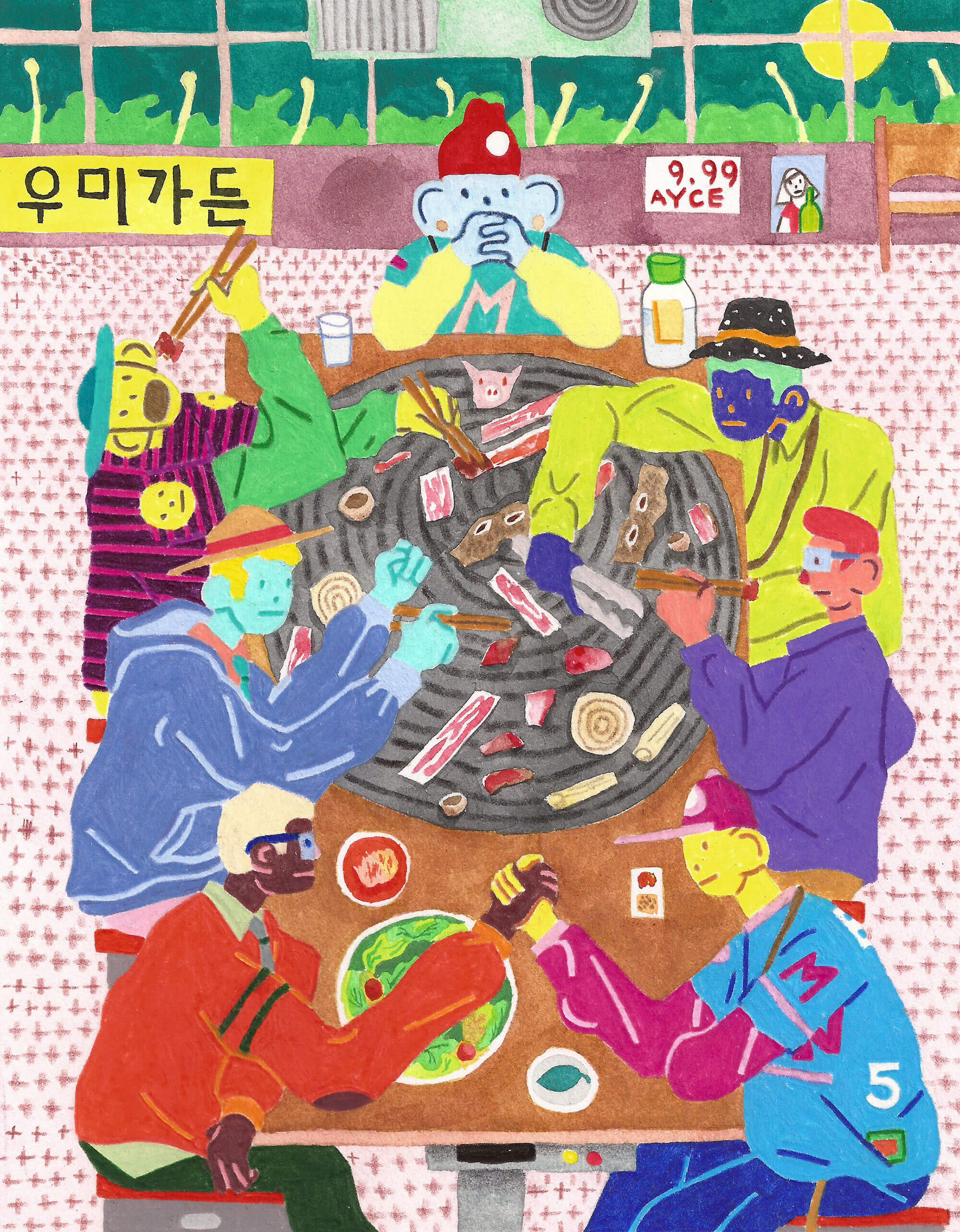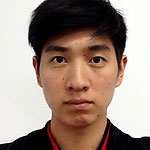
As the pieces begin to come together, Chung and AMP find a worthwhile ministry and new struggles in balancing fame and family.
Convicted of my calling, I started rap ministry as a solo artist in 2009. I began writing, creating mixtapes and an album, and performing — I knew this was where the Lord wanted me to be because the responses and feedback I had received were so encouraging. It was an exciting journey and everything was unfolding before my eyes, even though my life seemed quite hectic. I was working full time, serving as a youth pastor at my dad’s church, leading worship, leading two or three Bible studies, going to Washington Bible College full time — and also planning my wedding! I remember driving to Newark, New Jersey and Sumter, South Carolina just to do some shows, then come back and immediately go to work. I was not just living in the moment — I was on fire for God. It’s crazy to look back now, because I don’t know how I did it all; the Lord was definitely leading me through everything.
Strange as it might sound, the majority of the shows that I booked every month took place at African American churches. I didn’t know many Asian American Christians at the time, so when I started doing music, the only people I knew who were doing the same thing as me were Black. The people I hung out with were also mostly Black, and my musical style was darker and harder — it was more fitting for the African American community. In that entire first year of around 50 performances, I was probably only invited to perform at four Asian American events — and that was because I either had a connection with the pastor or because someone had vouched for me.
Still, these Asian American events would have a long-lasting effect on my career. Although I felt led by the Spirit, I was growing tired. In my first year, I had released two mixtapes and a solo Long Play (LP). At the same time, I did all my own marketing, booking, PR, websites, and anything else that needed to be done. I even remember researching all the churches in Frederick, Maryland and sending out 153 handmade press kits — no one responded. But that’s just how things were at the time. A mentor once told me, “There will be an unfamiliar road coming ahead. It will be different and may be discomforting, but it’s where you should be.” I didn’t know at the time that this might mean expanding my solo act.
I met Samuel Kim, who would soon become my manager, when I was sharing my testimony and some of my songs at a Korean Christian Ministry (KCM) retreat. He told me that when he first saw me, he thought to himself, “Who is this hoodlum? I need to witness to this guy!” After the show, he approached me and said, “We have to do some things together.” Later, we found out that he already knew my wife — Samuel used to give my wife, Cathy, and her younger brother rides to church when they grew up at the same church. What a small world! As we continued to work together, I met the other two guys who would later become the band AMP (short for Amplify Christ) — James Han, aka J. Han, and Sam Ock.
I had been invited to New Covenant Fellowship Church in Germantown, Maryland — probably the biggest Asian American church to invite me as a solo artist — because one of their college pastors was one of my mentors. Before I visited, he told me that one of his old youth group kids was also making some music. As soon as James and I met, we began making music together and releasing some free tracks — I even tried to help him piece together his first mixtape. This is when I met Sam Ock. James had posted a video of himself rapping on Facebook, which intrigued Sam, a musician and producer. For his mixtape, James acquired one of his tracks from Sam and that became the track all three of us collaborated on called “See You in Heaven”. The first time I met Sam Ock face to face was when we filmed a music video for this song. Groups like this usually take years to form, but we met and began to work together within the span of just six months!
Though our collaboration was successful and we clearly got along, we continued to work individually as solo artists. It wasn’t until two guys decided to drive all the way down to Maryland from Urbana, Illinois that things began to change. Eddie Lee and Joe Tek wanted to bring the three of us out to perform at an event they were calling “Entrusted Talents”. Over dinner, we discussed music, ministry, vision, and life. As Joe said during the meal, “Great things happen over Korean barbecue.” And he was right! We found ourselves standing outside in the rain and talking after dinner, when my manager Samuel asked, “What if you guys came together and formed a group? I think you have something special together.” I couldn’t help but have the impression that this was the “unfamiliar road” my mentor had warned me about.
This was a difficult decision to wrestle with — not just for me, but for all of us. It wasn’t enough to just say, “Let’s give it a try!” At the time, I had felt that J. Han’s and Sam’s styles of music were too upbeat and happy for me. If we were to become an actual group, it would call for each of us to die to our own hopes, dreams, and personal desires. We would be required to commit to one another and change the musical path we had each been walking as individuals. In addition, since I was older than the other two guys, my responsibilities were different — committing to this group would require more time recording and being on the road, which also meant more time away from my wife. Thankfully, my wife was gracious and understanding — I had been involved in rap ministry for a year already, so this decision made sense to her. My mom and church were also supportive, but my dad wasn’t too accepting of it, since he came from a more conservative background. He didn’t think rap was from the devil, as some thought, but he had a negative view toward hip hop and would say to me, “This is not what you’ll be doing for a long time.”

At the same time, I was excited because this would be something unique. Doing things to show we were united was important to all three of us, because we didn’t see much of that happening around us. It’s powerful when people come together and unify under one main purpose or mission. We would be naïve to think we could do and accomplish everything on our own. We were meant for community and to serve together as a body. I looked forward to the possibility of joining with two other talented brothers, and saw it as a way we could grow and mature together in our faith. After a few months of prayer, Sam, James, and I collectively felt the Lord moving us toward a certain answer. In January 2010, we decided to move forward, and AMP was formed.
Our group chemistry was great from the start. Our relationship was founded on more than our mutual interest in music. We genuinely cared for each other’s well-being and spiritual health. James and Sam felt like younger brothers to me, and since we all only have sisters, we became brothers to each other. We shared life together, held each other accountable, and prayed for each other.
The first two years were an incredible adventure filled with a large amount of traveling to different states and driving through the snow and through the night. It was a thrill to watch God move through people as we toured, made music, and served as an encouragement. People shared that our music was convicting and leading them to become more serious about their faith. Some even shared stories of how the music had led them to Christ and had been a means to get them through some dark times. It was crazy to see how God was using the music. We gained recognition as we visited different campus ministries. Pastors and youth leaders started to pay attention to us as more of their students listened to our music, and we began to cultivate relationships with various churches. By our third year, we started to see glimmers of “success”. We were landing gigs that covered our travel fees, more churches booked us, and we expanded the cities we toured in. We were made aware of our considerable prominence within the Korean American churches, and were caught by surprise — all this felt surreal.
The momentum only picked up from here — we released our sophomore album, “Glory Songs”, and began to see that our listeners extended to people outside the Asian American church. We were invited to perform at many different conferences, retreats, and revivals. We were being scouted by multiple record labels. We gauged a lot of interest from people in the Contemporary Christian Music community. It felt like everything was falling into place piece by piece. I felt like we were on top of the world, especially since we seemed to be the only Korean American Christian hip hop group out there.
As the momentum grew, we were forced to face the realities of the music industry. So far, AMP had been working in an Asian American bubble. This served as a disadvantage if we wanted to increase our networking reach in the music industry. We needed to rebrand our label because both our group and label names were AMP, which caused a lot of confusion. During our rebranding process, I began to realize how undereducated we were in terms of starting and running a label. The business behind a record label has many complexities, and it wasn’t as cut and dry as I had previously assumed. Things like contracts, royalties, percentages, guidelines, ethics, bylaws, personnel requirements, bookings — it was a monster of a feat to take on. But we trusted that this was where the Lord wanted us to move forward, knowing that although this seemed impossible, nothing is impossible for our God.
Still, it was a time of significant transition for the others in AMP — Sam and James graduated from college, and my wife gave birth to our first child, a beautiful baby girl. I was suddenly faced with questions regarding financial stability and providing for my family. I wasn’t sure how sustainable this life would be. I was torn: I wanted to continue making music and living life with Sam and James, but knew that my immediate family held precedence. As the demands grew, I began to have difficulty finding the balance between family and work, which began to take a toll on my family. In my conviction that I was called to minister through music and my natural hard-headedness, I didn’t realize how my choices were affecting those around me. I remember one evening as my wife and I were talking about my work, she said, “It seems like everything revolves around AMP and Good Fruit and I really feel that you’ve put us second.” That statement crushed me, because my heart had always been to be a good husband and father and to put my family first. Hearing the reality of my failure and how consumed I had become with my music, I knew that something had to change. I began reorganizing and managing my time, bringing on interns and helpers, and building a team, so that my work wouldn’t interfere with my family life. One of my past pastoral mentors had told me, “Churches and ministries will always have people to serve, but you can’t neglect to care for your family.” That resonates with my heart daily and I pray that I can live that out each and every day! My wife has been extremely gracious and understanding, but I’ve had to learn a great deal about putting family first during this time — especially after we had our daughter.
At the same time, a record label was pursuing us. As I openly discussed my thoughts with the other members of AMP, we acknowledged that we had all thought about stopping at one point because it was a lot of work. Although it was impacting people, the struggle for financial stability became more apparent. It would be hard to provide for our families and our future families with just music. What people don’t understand when they see an artist in the public sphere is the actual struggle behind the music. Although musicians can gain momentum and a following, it doesn’t always equate to financial success. In fact, many musicians and artists you see are struggling. Creating music costs a lot of money, and maintaining and running a label cost a lot of money. At the end of the day, it’s really tough to be financially sustainable, especially in a world where no one really buys music anymore since everything can be streamed. However, we knew that this was where the Lord wanted us to be and we wanted to be faithful, no matter the cost. At the end, we were all confronted with the same question — what’s next?

Chung Lee is co-founder and CEO of the Christian-based record label Good Fruit Co. and part of the hip hop trio called AMP. Chung is a husband and father and works a full-time career at the American College of Cardiology, while enrolled at Reformed Theological Seminary. As an artist he has toured with the likes of Star eld, Trip Lee, Casting Crowns, KJ-52, and Jimmy Needham.
